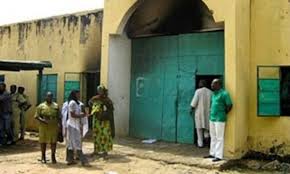News
Pardon Kuje prisoners who refuse to run away when terrorists attack facility, Ex-Taraba gov, Nyame to FG

Former Taraba State governor, Rev. Jolly Nyame has appealed to the Federal Government to release prisoners who refused to run away when terrorists attacked Kuje Correctional Centre last year that made several prisoners to escape, saying, that alone has demonstrated how those who refused to escape are now repentant citizens.
Explaining his experience while serving his prison terms, the ex-governor said he was scared by gunshots and prayed his last prayers, noting that all through his life, he never heard of the sound of an AK47 and Pistol until when terrorists came to Kuje Correctional Centre.
He said he never believed he would see the following morning alive, stressing that it was only God in his infinite mercy that saw him through that harrowing experience other with persons.

If given opportunity to suggest to Federal Government on Prison reforms, he said it should start from justice delivery even as many prisoners are languishing for what they know nothing about.
He said: “If I should suggest to the Federal Government to consider reform in the prison, I will start with justice delivery. But let us talk about the disposition of some of the inmates. First of all, I would like to appeal to the Federal Government to consider those who voluntarily refused to go when the attack happened to be granted pardon. That place is not a place that one would like to stay if he has the opportunity to escape.
“So, how I wish that the Federal Government will grant pardon to those who refused to escape during the attack. That apart, during my years in prison, I interacted with a lot of inmates and I realised that there is something wrong with prosecution in this country.”
In an interview with Punch, Nyame said while in prison, he interacted with some inmates and discovered that they were in prison because they don’t have money to pay extortionists, while there were no due diligences in prosecution.
He continued: “In the course of my interactions with the inmates, I discovered that some of them were wrongly accused and the prosecution would tell them, ‘Look, if you are able to pay so and so amount of money, you will be freed and not taken to prison’. So, you will discover that sometimes, people go to court and later prison because they don’t have the money to pay. I also realised that if there is due diligence in prosecution, not many people will go to prison.”

























